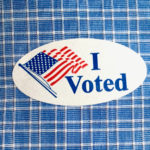In a democracy, everyone gets a vote … unless a person is disqualified for certain reasons or doesn’t show up to vote. All that follows “unless” is the source of our friction.
What kinds of things disqualify a person from voting? Why would a person not show up to vote?
Answers to these two questions may appear in the legislation passed by the Texas House and Senate during its special session. More certain is how the voting law has separated Republicans and Democrats—ideologically and geographically. Though the new law is decided largely as Republicans wanted, it doesn’t settle elections.
One thing SB1 does, however, is clarify opportunities churches have to serve their communities. Will churches seize those opportunities, even if it means helping someone vote against them?
For or against
Proponents of SB1 describe the new law as election integrity and security. As central as voting is to our democracy, we ought to take election integrity and security seriously. Baptist churches understand and appreciate this.
When we vote on church business, we only want church members to vote. We have rules for who qualifies as a church member. In some churches, these rules allow the 5-year-old baptized last Sunday to vote next Sunday on the church budget and the pastor’s employment. It might be time to improve our children’s sermons.
We also have bylaws dictating when and how votes can be held and when and how church members must be notified of upcoming votes. These bylaws are sacred; we follow them as meticulously and religiously as we follow Robert’s Rules of Order, which is to say, most of the time.
When we vote, we ask for “ayes,” raised hands and like signs. When it’s really serious, we use secret ballots, because we value election integrity.
We don’t take issue with election integrity, unless it’s a euphemism.
Sign up for our weekly edition and get all our headlines in your inbox on Thursdays
Critics of SB1 read “election integrity” as just that, a euphemism. They describe the new law as voter suppression, believing SB1 will make voting more difficult for the elderly, people of color and those with disabilities. Loving our neighbor as ourselves requires us to take this concern seriously.
How can we pursue election integrity that does not restrict voting to the point of suppression? Answering that question requires at least another legislative session. Or some proactive service from churches.
How churches can serve their communities
Churches can familiarize themselves with their communities and the qualifications for voting, and can study the overlap between those qualifications and the people in their communities. Who is unqualified, and why? Are the qualifications just? If not, what needs to change?
We also can familiarize ourselves with the reasons people don’t show up to vote. Is it a lack of transportation, a need for physical assistance, conflicting work hours, a lack of information, fear? Christians and churches can show love of neighbor concretely in response to each of these reasons.
Churches are in the communication business. We can inform our communities about upcoming elections, candidates and ballot initiatives. Churches don’t have to take positions on particular candidates or issues to communicate when local, state and national elections will be held, who and what will be on the ballot, what voting qualifications are, where polling locations are and where to find more information. If churches must take a position, it should include making the good and bad known about every candidate and legislative proposal.
One thing churches communicate, at least verbally, is concern for “the least of these.” If we know our communities as well as we should, then we know who “the least of these” are in our communities. In case we aren’t sure, “the least of these” tend to be those without transportation, with disability, who work hours in conflict with voting hours and, yes, people of color.
Churches can provide transportation to polling places. Whether a church uses its own bus or van, rents one or recruits members with adequate transportation, we can overcome the barrier of transportation. We can get people to the polls.
Churches can provide appropriate education and assistance to those individuals who do not qualify at present but who would qualify if they had proper identification or documentation. We can support those pursuing citizenship. We don’t have to sit back and hope someone else serves at these points of need.
Christian business owners and employers can provide time during the workday or workweek for their employees to vote, even if it costs the business. Decreasing the number of early voting hours does not have to present an obstacle to voting for those who work for Christians.
Some have expressed concern about “free movement” granted to partisan poll watchers, who some believe will intimidate voters. Here again, churches can be proactive. They can encourage their kindhearted, servant-hearted, even-keeled members—the kind who make good deacons—to be first to sign up for poll-watching duty.
Where we can work together
In our divided politics, it’s easy to be cynical, to see voting laws as more about strategy than integrity. If there’s a place to be wise as serpents and innocent as doves, political strategy is such a place.
As divisive as the issue is, churches can come together to serve their communities. SB1 does not prohibit churches from doing that, but clarifies ways to serve our communities more, to walk the extra mile.
On Sept. 1, 666 new laws went into effect in Texas. Christians won’t be able to keep up with them all. They can, however, live by at least one law: Love your neighbor as yourself, even if it means helping your neighbor vote against you.
Eric Black is the executive director, publisher and editor of the Baptist Standard. He can be reached at [email protected] or on Twitter at @EricBlackBSP.














We seek to connect God’s story and God’s people around the world. To learn more about God’s story, click here.
Send comments and feedback to Eric Black, our editor. For comments to be published, please specify “letter to the editor.” Maximum length for publication is 300 words.